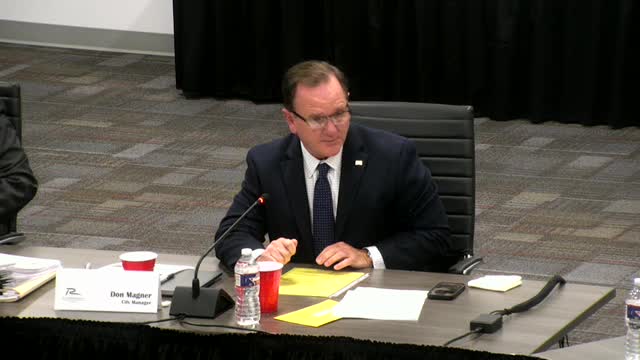Richardson staff, consultants present solid-waste master plan with staffing and route changes
Get AI-powered insights, summaries, and transcripts
Subscribe
Summary
Consultants from Burns & McDonnell and Richardson public‑services staff briefed the Richardson City Council on an updated solid‑waste master plan and asked the council to concur with policy and implementation steps that would move the plan into final form.
Consultants from Burns & McDonnell and Richardson public‑services staff briefed the Richardson City Council on an updated solid‑waste master plan and asked the council to concur with policy and implementation steps that would move the plan into final form.
The presentation, led by Scott Pasternak of Burns & McDonnell and Allison Acarias (presentation lead), laid out short‑term operational changes (route resizing, staffing shifts, a dedicated commercial business analyst), a staged plan for the city’s recycling drop‑off site, and options to procure multifamily/commercial recycling and construction-and‑demolition (C&D) hauling through competitive contracts. The consultants and staff said the recommendations are intended to be implemented over 2025–2029 and are presented as recommendations subject to council funding and approval.
Why it matters: the report ties operational changes to estimated cost‑of‑service impacts and to service equity, safety and reliability goals. Consultants emphasized that current reliance on temporary workers creates operational risk and inequity between recycling and trash crews; they recommended increases in full‑time equivalents to reach an industry best practice 20% staff reserve, resizing routes to equalize hours worked and households collected, and added equipment to reduce operational reliance on other divisions.
What the plan recommends: Burns & McDonnell divided the work into phases.
- Single‑family residential: Phase 1 would reassign recycling supervisor responsibilities (no direct fiscal impact), and later phases would resize residential routes and replace temporary workers with full‑time equivalents. The presenters estimated a combined fiscal impact of roughly $0.42 per household per month if all phases were implemented (figures stated in 2025 dollars; no inflation applied). Scott Pasternak said the route resizing would reduce the number of routes while keeping required rear‑load and recycling loader positions.
- “Bulk”/on‑call collections: The consultant called out a change to the request window (from midnight the day before collection to a three‑calendar‑day window) to allow planning time and limit weekend work; the team said the three‑day window could be revisited (it was described in Q&A as adjustable and any advance notice would help operations).
- Recycling drop‑off: staff recommended staffing the existing drop‑off to collect user/material data in 2025, then use that data to inform longer‑term decisions. If illegal dumping remains a problem, the plan included a low‑cost security camera option (estimated about $0.02 per household per month in 2026). Permanent closure, continued operation, or facility upgrades remain options pending data.
- Commercial collection: the plan recommended creating a commercial business analyst position (estimated $2.10 per typical 8‑cubic‑yard customer per month in 2026 for the position) and one heavy‑equipment operator to reduce overtime. Consultants said substantial overtime in 2023 (1,561 overtime hours) drives much of the need for staffing changes and that a business analyst could help “right‑size” service levels to capture revenue and reduce unnecessary collections.
- Multifamily, commercial recycling and C&D hauling: staff and consultants recommended exploring an exclusive franchise or competitive procurement (RFP) to provide multifamily/commercial recycling and C&D hauling. Consultants and city staff said procurement can consolidate purchasing power, reduce trucks on city streets and improve contract oversight. City staff also noted a contractual obligation with the North Texas Municipal Water District that requires certain C&D to be delivered to the Melissa Landfill; staff said enforcing that requirement across many haulers is difficult and that an exclusive franchise could improve compliance.
Costs and timing: presenters stressed the numbers on the slides are cost‑of‑service estimates (not final rates) and are shown in 2025 dollars without inflation. The consultants presented a scenario in which all recommended enhancements would raise cost‑of‑service to about $40.15 per household per month by FY2029; presenters said that number could be reduced by phasing or by implementing only some of the later enhancements. Staff said vehicle purchases generally target a 6–8 year life cycle and are included in replacement planning; vehicle/equipment costs are one of several rate drivers alongside labor and fuel.
Council discussion and next steps: councilmembers asked about the basis for route counts, the effect of a longer bulk‑collection request window on curbside clutter, details on the proposed franchise for C&D hauling and potential impacts on contractors, and whether some costs could be phased into future budgets to limit rate impacts on seniors and fixed‑income residents. Staff and consultants replied that their time‑and‑motion modeling informed route and hours estimates; that outreach/education could mitigate curbside issues if longer notice is used; and that the proposed C&D franchise would be explored via an RFP so council could compare pricing and contract terms before a decision. Staff said the final draft plan would be provided to the city within weeks, and implementation timing and funding would return to council through the normal budget and procurement processes.
Ending: staff said the council’s concurrence with the policy directions tonight would allow the consultants to complete the final master plan document and return with budget and implementation steps for council consideration.
